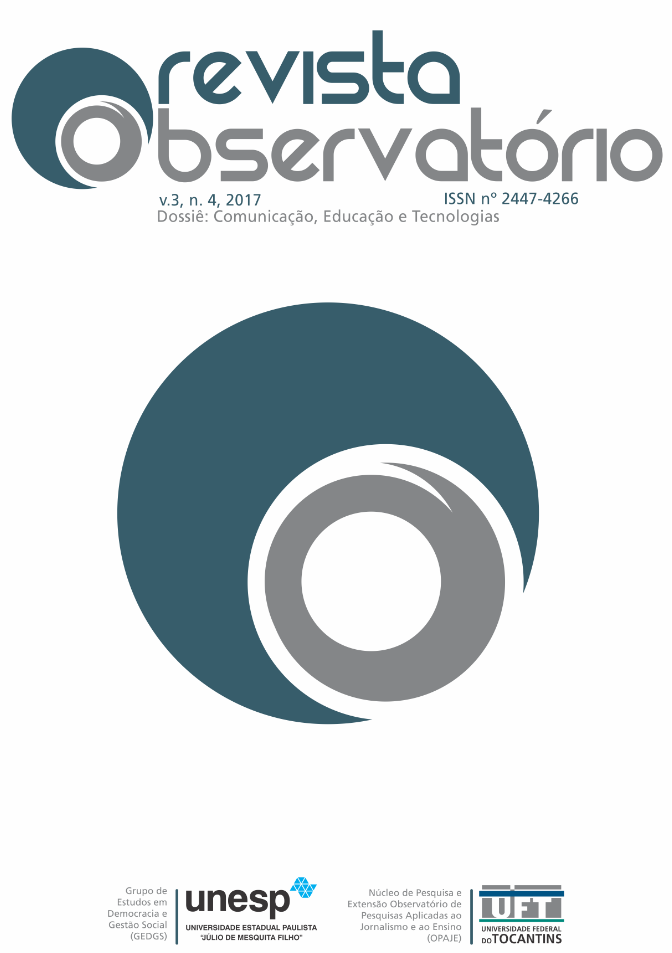DE LA REVISIÓN EN LA ESCRITA: una gestión exigente requerida por la relación entre lector, autor y texto escrito
DOI:
https://doi.org/10.20873/uft.2447-4266.2017v3n4p488Palabras clave:
revisión, recursividad, auto revisión, revisión profesional, lectorResumen
La elección de los términos más ajustados a determinados conceptos no se revela una tarea fácil. Sommers (1978) avanza que, en virtud de ser urgente lanzar una visión de la escrita como proceso, no se pensó en proponer una nueva terminología, por lo que de esa omisión resultó la permanencia del término «revisión», con el riesgo de la revisión seguir siendo vista como la última etapa de una escrita lineal. Este artículo tiene por objetivo destacar el potencial recursivo de la «revisión» de la escrita en lo que esta significa: 1) comprobación del isomorfismo esperado entre lo que se pretendía decir y lo que realmente quedó escrito para que la comunicación resulte mejor; 2) actuación, a diferentes niveles, contemplando o no la audiencia; 3) combinación de lo qué es con cómo se transmite; 4) distinción entre la auto revisión y la revisión profesional; y 5) cultura de un distanciamiento del lector ante el material escrito
Descargas
Citas
ALEXANDROV, Andrei V. How to write a research paper. Cerebrovascular Diseases, vol. 18, 2004, p. 135-138.
ALLAL, Linda; CHANQUOY, Lucile. Introduction. Revision revisited. In: ALLAL, Linda; CHANQUOY, Lucile; LARGY, Pierre (Eds.). Revision. Cognitive and instructional processes. Boston: Kluwer Academic Publishers, 2004, p. 1-7.
ATKINSON, Dwight. Writing and culture in the post-process era. Journal of Second Language Writing, vol. 12, 2003, p. 49-63.
BISAILLON, Jocelyne, Sur les traces d’un réviseur professionnel d’expérience. In: BISAILLON, Jocelyne (sous la direction de). La révision professionnelle: processus, stratégies et pratiques. Canada: Édtions Nota Bene, 2007a, p. 49-73.
BISAILLON, Jocelyne. Professional editing strategies used by six editors. Written Communication, v. 24, n. 4, 2007b, p. 295-322.
BOULINIER, Michelle. Le rythme et l’espace chez l’être humain. Lettre d’Information de l’Association Langage Lecture Orthographe, n. 7, oct. 1989, p. 3-4.
BURROUGH-BOENISCH, Joy. International reading strategies for IMRD articles. Written Communication, vol. 16, n. 3, 1999, p. 296-316.
CLOUTIER, Francine. La clarté : pour qui? Recherches en Rédaction Professionnelle, vol. 1, n. 1, 2001, p. 1-9.
FAIGLEY, Lester. Competing theories of process: a critique and a proposal. College English, v. 48, n. 6, 1986, p. 527-542.
FITZGERALD, Jill. Research on revision in writing. Review of Educational Research, v. 57, n. 4, 1987, p. 481-506.
HAYES, John R.; FLOWER, Linda; SCHRIVER, Karen A.; STRATMAN, James F.; CAREY, Linda. Cognitive processes in revision. In: ROSENBERG, S. (Ed.). Reading, writing, and language processes. Cambridge, England: Cambridge University Press, 1987, p. 176-240.
HOLLIWAY, David R.; MCCUTCHEN, Deborah. Audience perspective in young writers’ composing and revising. Reading as the reader. In: ALLAL, Linda; CHANQUOY, Lucile; LARGY, Pierre (Eds.). Revision. Cognitive and instructional processes. Boston: Kluwer Academic Publishers, 2004, p. 87-101.
HOLSANOVA, Jana; HOLMQVIST, Kenneth; RAHM, Henrik. Entry points and reading paths on newspapers spreads: comparing a semiotic analysis with eye-tracking measurements. Visual Communication, vol. 5, n. 1, 2006, p. 65-93. Sage Publications.
LANHAM, Richard, A. Revising prose. Fifth editon. New York: Pearson Longman. 2006.
LIBRA, Judy A. How to Write a Paper. Introduction to Scientific Work Seminar, Module 6. International Study Course Environmental and Resource Management, Brandenburg Technical University Cottbus, Germany 2001.
MIŚAK, Aleksandra; MARUŚIĆ, Matko; MARUŚIĆ, Ana. 2005. Manuscript editing as a way of teaching academic writing: Experience from a small scientific journal. Journal of Second Language Writing, vol. 14, 2005, p. 122-131.
MURRAY, Donald M. The craft of revision. Fifth Anniversary Edition. Boston: Wadsworth Cengage Learning, 2013.
NWOGU, Kevin N. The medical research paper: Structure and functions. English for Specific Purposes, vol.16, n. 2, 1997, p. 119–138.
ODELL, Lee. Teaching writing by teaching the process of discovery: an interdisciplinary enterprise. In: GREGG, Lee W.; STEINBERG, Erwin R. (Eds.). Cognitive processes in writing. Hillsdale, New Jersey: Lawrence Erlbaum Associates, Publishers, 1980, p. 139-154.
OLSON, David R. The world on paper. The conceptual and cognitive implications of writing and reading. Cambridge: Cambridge University Press. 1994.
OLSON, David R.; OATLEY, Keith. The quotation theory of writing. Written Communication, vol. 31, n. 1, 2014, p. 4-26.
ROUSSEY, Jean-Yves; PIOLAT, Annie. Critical Reading effort during text revision. European Journal of Cognitive Psychology, vol. 20, n. 4, 2008, p. 765-792.
ROHMAN, D. Gordon. The stage of discovery in the writing process. College Composition and Communication, vol. 16, n. 2, 1965, p. 106-112.
SHAFTO, Meredith A. Proofreading in young and older adults: the effect of error category and comprehension difficulty. Int. J. Environ. Res. Public Health, vol. 12, 2015, p. 14445-14460.
SOLLACI, Luciana B.; PEREIRA, Mauricio G. The introduction, methods, results, and discussion (IMRAD) structure: a fifty-year survey. J Med Libr Assoc, vol. 92, n. 3, 2004, p. 364-367.
SOMMERS, Nancy. Response to Sharon Crowley, “Components of the composing process”. College Composition and Communication, vol. 29, n. 2, 1978, p. 209-211.
VANDENDAELE, Astrid; DE CUYPERE, Ludovic; VAN PRAET, Ellen. Beyond “trimming the fat”: The sub-editing stage of newswriting. Written Communication, vol. 37, n. 4, 2015, p. 368-395.
Descargas
Publicado
Cómo citar
Número
Sección
Licencia
[PT] Autores que publicam nesta revista concordam com os seguintes termos:
1. Autores mantém os direitos autorais e concedem à revista, sem pagamento, o direito de primeira publicação, com o trabalho simultaneamente licenciado sob a Creative Commons Attribution License (CC BY-NC 4.0), permitindo o compartilhamento do trabalho com reconhecimento da autoria do trabalho e publicação inicial nesta revista.
Leia todos os termos dos direitos autorais aqui.

